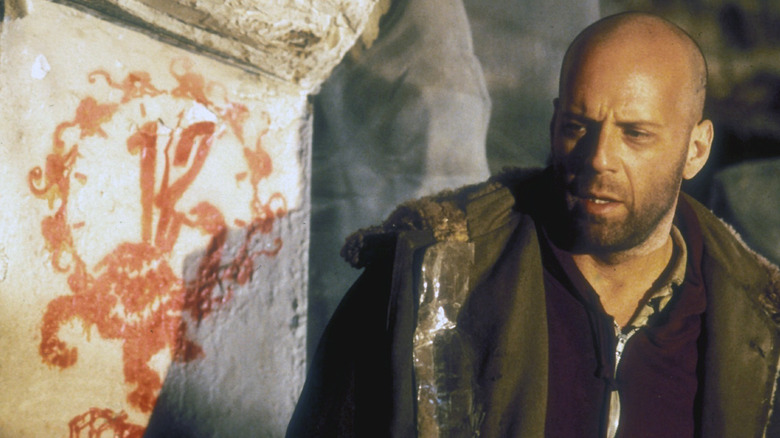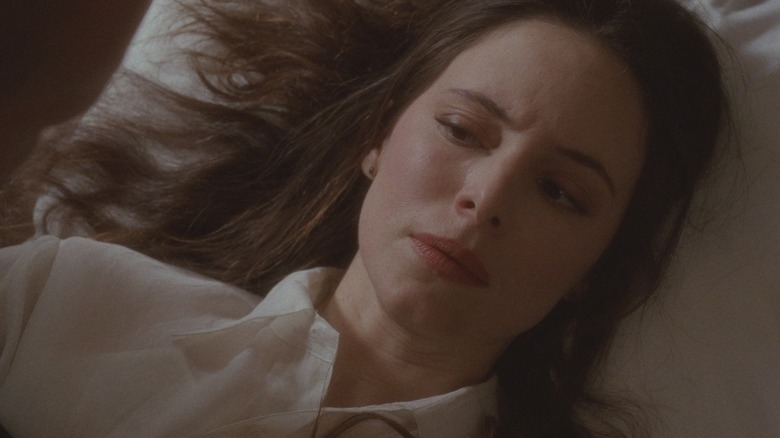12 Monkeys Found Its Composer By Flipping A Coin
The 1995 film "12 Monkeys" was one of the few times a Terry Gilliam film wasn't beset with chaos and production problems. Gilliam is notoriously unlucky — not to mention incredibly headstrong — so many of his features were only made after last-minute disasters, deaths, or other major catastrophes. One can see Gilliam's unluckiness in play in Keith Fulton's and Louis Pepe's 2002 documentary "Lost in La Mancha," which traced the director's first, stalled attempt to make "The Man Who Killed Don Quixote." Also, one doesn't need to be a deep-cut cineaste to know all about the issues Gilliam had with his 1983 sci-fi film "Brazil," a picture that was re-cut multiple times.
For "12 Monkeys," though, everything seemed to work out okay. Based on Chris Marker's 1962 short film "La Jetée," the film begins in 2035 after most of humanity has been killed by a lethal virus. Survivors were forced into underground prisons, only occasionally venturing in solo missions to the surface to look for spiders, thought to be the cause of the disease. Bruce Willis plays James Cole, a slightly unbalanced prisoner who is drafted into a pair of time travel missions to the years 1990 and 1996, hoping to find more information about what started the disease. When Cole tries to communicate his mission to the people of the present, he appears mad.
The music for "12 Monkeys" is a tinkling, off-balanced music box score, extrapolated from Astor Piazzolla's "Suite Punta del Este," an Argentinian tango sonata. The score was written by late rocker Paul Buckmaster, although, according to an oral history printed in The Hollywood Reporter, it was almost Thomas Newman. Actress Madeleine Stowe recalls that Gilliam liked both composers equally, so had to choose between them by flipping a coin.
Paul Buckmaster vs. Thomas Newman
Paul Buckmaster was a well-known presence in the rock world, having worked on orchestrations with David Bowie, The Grateful Dead, Leonard Cohen, Miles Davis, Guns N' Roses, Taylor Swift, The Rolling Stones, Celine Dion, and several others. In film, Buckmaster had performed songs for Roman Polanski's "Macbeth," Harry Nilsson's terrible oddity "Son of Dracula," and "The Man Who Fell to Earth." "12 Monkeys" was to be his first film composition work for a project that wasn't a musical or starring a musician.
Thomas Newman, meanwhile, was already a prolific composer by 1995, having written the scores to notable films like "Revenge of the Nerds," "Real Genius," "The Lost Boys," "Fried Green Tomatoes," "The Player," "The Shawshank Redemption" and dozens of others. He was nimble, prolific, and talented. It was Madeleine Stowe who mentioned Newman to Gilliam, as she heard he was having trouble deciding on a composer. Gilliam loved Newman, which posed an issue as to whom he should hire. Stowe tells the story thus:
"We were discussing who he wanted to score it. I said, 'Please, please look at this fellow named Thomas Newman.' I was a huge Thomas Newman fan. Terry said, 'Well, I've already kind of committed [to Buckmaster],' but he met him. They flew him to London, and he fell in love with Thomas. So he didn't know what to do. The way he had to choose between the two men, was he flipped a coin."
Given the off-kilter tone of "12 Monkeys," perhaps a composer from the non-film world was more appropriate than a more "traditional" film composer. Apologies to Stowe, however, who lost her preferred composer in the coin flip. Buckmaster would only compose one other movie, and it was, curiously, "Most Wanted" in 1997. Newman, meanwhile, went on to score films for Pixar and the James Bond franchise.

